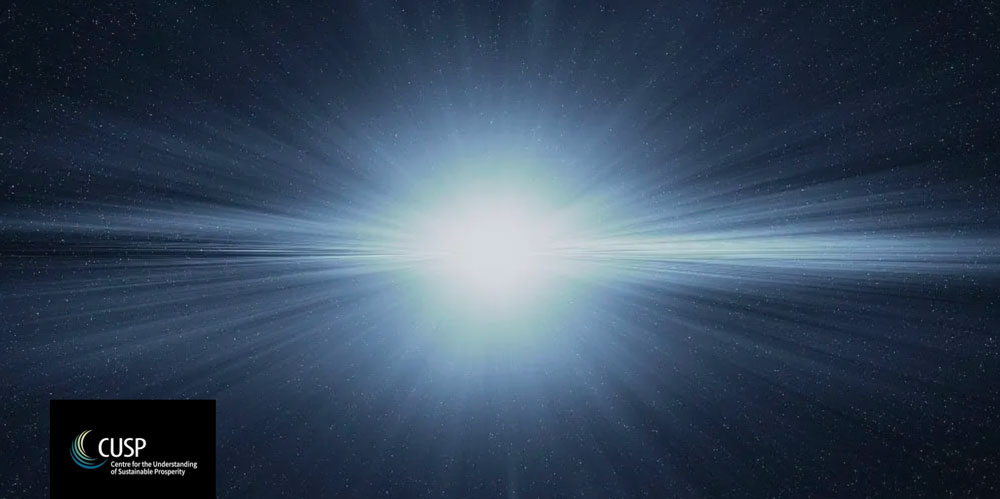Giorgos Kallis’ Degrowth | A review by Sarah Hafner
Rethinking our economic paradigms is an urgent and fundamentally important task. Giorgos Kallis’ new book Degrowth is adding to a joint endeavour of postgrowth thinking, CUSP PhD candidate Sarah Hafner finds. It offers both, a justification as well as a vision and new imaginary for the degrowth agenda.

Rethinking the prevailing economic ‘growth’-paradigm in economics is an urgent and fundamentally important task. Equally important is it to think about ‘socially and environmental sustainable’ alternatives and the transition towards these alternative/s (see Jackson, 2017; Martínez-Alier et al., 2012).
Giorgos Kallis, Research Professor at the University Autònoma de Barcelona (UAB) and well-known for his contributions in the degrowth literature, opts exactly for this endeavour in his new comprehensive summary and thought-provoking book Degrowth. This blog provides a short review.
Economic approach / Economic system
The author himself situates his work at the interface of two approaches: the economic and the political or utopian one. This is also how this book review is structured.
The reader of the book learns quickly that in Kallis’ perspective degrowth “is not an economic theory, much less of an economic contradiction” and so, he clarifies from the beginning that his book doesn’t engage with tackling traditional growth and economic theories (see e.g. Lange, 2018 for an overview on the latter; as well as e.g. Jackson, 2017 and Jackson and Victor, 2018 for economic modelling work on this topic), and is focusing instead on the interrelations of the economic system with the political and societal/social system.
Degrowth, as developed in the book, stands in clear contrast to the prevailing capitalist system (see also Foster, 2011 or Jackson, 2017); well-being as a function (up to some level) of income and relative income (i.e. related to status and positional consumption; e.g. Kahnemann and Daeton, 2010; Easterlin, 1975), Kallis argues, is not a universal fact, but heavily related to the emphasized values in the current (capitalist) system. What is well-being? Kallis doesn’t shy away from existentialism and the systemic implications of capitalism on our individual journeys to come to answers—money and capitalism, he argues, are not only not delivering on the promise of happiness, they often actually hinder us in asking fundamentally important life questions (see also Jackson, 2013; Skidelsky and Skidelsky, 2012).
Fascinating to read also are Kallis’ answers to some of the critics of degrowth. Interesting in particular are his elaborations on the contrasts of degrowth and green growth (see e.g. OECD, 2011 on green growth; Loiseau et al, 2016 for an overview on related concepts). Understood as an introduction and summary of the degrowth agenda, Kallis is eloquently collating the ‘limits to growth’ evidence, both, with regard to environmental limits (see also Daly, 1991; Costanza, 1992; Georgescu-Roegen, 1993; Meadows and Randers, 2012) and social limits (see Hirsch, 2005; Easterlin, 1974; Jackson, 2017).
Political and utopian approach
For Kallis (2011) degrowth is an “umbrella keyword, a multi-faceted framework that gives purpose and connects different policies and citizen initiatives”. The political and transformational agenda is also reflected in here. Ultimately, Kallis’ new book is a call to action, a call for a “socially sustainable economic degrowth transformation”, that should take the form of a peaceful social revolution towards new ways of living, new imaginaries of the economy, the political system and the society, and new life-values—rather than allowing (or facilitating) catastrophic collapse.
And challenges he sees. The book clearly describes, with various concrete examples, the challenges involved in and size of the required radical system transformations on the social, political and economic level (see also Dryzek, 1997; Latour, 2007). In that sense, the investigation of the form of the political system (e.g. whether liberal democracy is compatible with degrowth) is an important part of Kallis’ new book (related is the work of CUSP colleague Marit Hammond, who investigates the role of democracy within a transition to sustainable prosperity (Hammond and Smith, 2017). As well as how the current political system and the institutional framework are linked to capitalism (see also Bonaiuti, 2012). Besides that, the book eloquently summarises the ecological and societal benefits emerging of the new way of living within a degrowth scenario.
Policy plays a role, too, of course, in Kallis’ elaborations, and so, towards the end of the book (chapter five) he discusses proposals such as part-time work, an ecological tax reform or basic income (see also Jackson, 2017 or Latouche, 2009), a co-evolutionary framework (Kallis & Norgaard, 2010) and grass-root initiatives (see D’Alisa et al, 2013).
It would have been interesting to read more about how the different policy-obstacles (e.g. power accumulation in the hands of a few) could be tackled in more concrete terms. However, as Kallis himself writes, this might be a question for future research and hence he reflects on the current state of knowledge in this strand of the postgrowth literature.
Conclusion
Overall, Kallis book Degrowth, by putting together various sources and main key-words on the topic and integrating them into a consistent framework, provides an informative and comprehensive resource on degrowth indeed, and its economic, political and societal/social aspects (related is the work of e.g. Jackson, 2017; Victor, 2008; Latouche, 2009 or Martínez-Alier et al, 2010).
The book offers both, a justification as well as a vision and new imaginary for degrowth. It provides readers with various backgrounds, and adds new insights. Kallis’ hypotheses and theories are well- researched, and linked to empirical data.
Links
- The book is available for purchase on the Agenda Publishing website.
- For an insightful conversation between Giorgos Kallis and Tim Jackson, see the Green European Journal website.
FURTHER READING
References
Costanza, R 1992. Ecological economics: the science and management of sustainability. Columbia University Press.
D’Alisa, G, Demaria, F, and C Cattaneo 2013. Civil and uncivil actors for a degrowth society. Journal of Civil Society, 9(2), 212-224.
Daly, H E 1991. Steady-state economics: with new essays. Island Press.
Demaria, F, Schneider, F, Sekulova, F and J Martinez-Alier 2013. What is degrowth? From an activist slogan to a social movement. Environmental Values, 22(2), 191-215.
Dryzek, J 1997. The politics of the earth.
Easterlin, R A 1974. Does economic growth improve the human lot? Some empirical evidence. In Nations and households in economic growth (pp. 89-125).
Foster, J B 2011. Capitalism and degrowth: An impossibility theorem. Monthly Review, 62(8), 26-33.
Georgescu-Roegen, N 1993. The entropy law and the economic problem. Valuing the earth: Economics, ecology, ethics, 75-88.
Hammond, M and G Smith 2017. Sustainable Prosperity and Democracy—A Research Agenda. CUSP Working Paper No 8. Guildford: University of Surrey.
Hirsch, F 2005. Social limits to growth. Routledge.
Jackson, T 2013: Escaping the ‘iron cage’ of consumerism. Wuppertal Spezial (Vol 48), Wuppertal Institute for Climate, Environment and Energy.
Jackson, T, 2017. Prosperity Without Growth: Foundations for the Economy of Tomorrow. Taylor & Francis.
Jackson, T and P Victor 2018. LowGrow SFC—a stock-flow consistent ecological macroeconomic model for Canada.
Kahneman, D, and Deaton, A 2010. High income improves evaluation of life but not emotional well-being. Proceedings of the national academy of sciences, 107(38), 16489-16493.
Kallis, G 2011. In defence of degrowth. Ecological Economics, 70(5), 873-880.
Kallis, G, and R B Norgaard 2010. Coevolutionary ecological economics. Ecological economics, 69(4), 690-699.
Lange, S 2018. Macroeconomics without growth. Metropolis Verlag.
Latouche, S 2009. Farewell to growth. Polity.
Latour, B 2007. To modernize or to ecologize? That is the question. Technoscience: The Politics of Interventions, 249-72.
Loiseau, E, Saikku, L, Antikainen, R, Droste, N. Hansjürgens, B, Pitkänen, K., … and M Thomsen 2016. Green economy and related concepts: An overview. Journal of cleaner production, 139, 361-371.
Martínez-Alier, J, Pascual, U, Vivien, F D, and E Zaccai 2010. Sustainable de-growth: Mapping the context, criticisms and future prospects of an emergent paradigm. Ecological economics, 69(9), 1741-1747.
Meadows, D, and J Randers 2012. The limits to growth: the 30-year update. Routledge.
OECD 2011. Towards green growth. Organisation for Economic Co-operation and Development.
Schneider, F, Kallis, G, and J Martinez-Alier 2010. Crisis or opportunity? Economic degrowth for social equity and ecological sustainability. Introduction to this special issue. Journal of cleaner production, 18(6), 511-518.
Skidelsky, E and R Skidelsky 2012. How much is enough?: money and the good life. Penguin UK.
Victor, P A 2008. Managing without growth: slower by design, not disaster. Edward Elgar Publishing.



